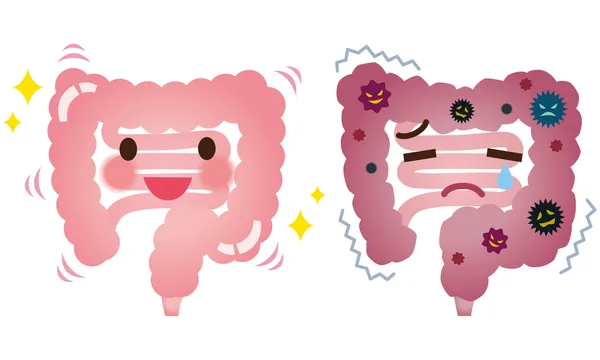- Ulcerative colitis is a type of inflammatory bowel disease that develops when your colon or rectum (or in some cases, both) become inflamed.
- UC affects about 900,000 individuals in the U.S.
- The exact cause of ulcerative colitis is complex but experts believe it could be caused by an overactive immune system.
- Even though there is no cure, there are treatment options available that can help you manage the disease.
Do you need to take frequent trips to the bathroom? Perhaps you’re suddenly feeling overly tired every day or experiencing unusual abdominal pain or cramping. If that’s the case, you might be suffering from a type of inflammatory bowel disease known as ulcerative colitis.
Roughly 900,000 individuals are living with ulcerative colitis in the United States. And while it often develops between the ages of 15 and 30, anyone can develop it at any age. There’s a lot more to know about it too. So, let’s take a look at what ulcerative colitis is, what causes it, the signs to look out for, plus how to treat it.
What Is Ulcerative Colitis?
Ulcerative colitis is a type of inflammatory bowel disease (IBD) that develops when your colon (large intestine) or rectum (or in some cases, both) become inflamed. Over time, the inflammation causes small sores, known as ulcers, to develop on the lining of your colon. The inflammation often starts in the rectum and eventually spreads upward, sometimes involving the whole colon.
Many ulcerative colitis sufferers experience frequent bowel movements. This is because the inflammation “causes your bowel to move its contents rapidly and empty frequently,” explains Healthline. The ulcers can also cause bleeding, mucus, and pus.
Colitis vs Ulcerative Colitis: What’s the Difference?
You might hear the terms colitis and ulcerative colitis thrown around interchangeably but they don’t mean the same thing. In short, colitis merely means the colon is inflamed, explains the Cleveland Clinic. Inflammation can be caused by various factors such as infection.
Ulcerative colitis, on the other hand, is more severe. It’s not caused by an infection and it’s an incurable chronic condition, meaning you’ll have it for life. Luckily there are treatment strategies available that can help you manage the condition, which we’ll get into more detail later in this article.
Types of Ulcerative Colitis
Ulcerative colitis can be categorized into different types depending on its location. According to the Mayo Clinic, the types of ulcerative colitis include:
- Ulcerative proctitis causes inflammation in the rectum which typically causes rectal bleeding.
- Left-sided colitis (also known as distal ulcerative colitis) causes inflammation from the rectum up through the sigmoid and descending colon. This type often causes abdominal cramping, pain on the left side, an urgency to defecate, and bloody diarrhea.
- Proctosigmoiditis causes inflammation in the rectum and sigmoid colon. Symptoms typically involve abdominal cramps, bloody diarrhea, and an inability to move the bowels.
- Pancolitis causes inflammation in the entire colon and typically causes severe bloody diarrhea, abdominal cramps, fatigue, and weight loss.
What Causes Ulcerative Colitis?
The exact cause of ulcerative colitis is complex. Experts believe it could be caused by an overactive immune system. While the immune system has an important job of protecting your body from germs, viruses, and other harmful substances, in some cases, the immune system “mistakenly attacks your body, which causes inflammation and tissue damage,” explains the Cleveland Clinic.
Other factors may play a role in the development of ulcerative colitis too, such as your genes. It’s possible to inherit a gene from one of your parents which may increase your chance of developing the disease. Having another immune disorder and being exposed to certain environmental factors (such as bacteria and viruses) may also trigger your immune system and increase your risk of ulcerative colitis.
Risk Factors
Ulcerative Colitis can affect anyone but certain factors may increase your risk. For starters, it typically develops before the age of 30. That said, it can still occur at any age, and in some cases, an individual won’t develop the disease until their golden years.
Men and women have an equal chance of developing the disease, however, your race or ethnicity may increase your risk. The Mayo Clinic says white individuals have the highest risk of the disease, and if “you’re of Ashkenazi Jewish descent, your risk is even higher.” Finally, having a family history of the disease may also increase your risk.
Signs and Symptoms of Ulcerative Colitis
The symptoms of ulcerative colitis can vary for each individual and they can even change over time. That said, some of the common early signs and symptoms to be on the lookout for include abdominal pain, diarrhea, an urgency to defecate, fatigue, nausea, weight loss, and anemia.
Over time, other symptoms can develop too. The Cleveland Clinic says this may include severe cramping, bloody stools, mucus or pus in the stool, fever, skin problems, mouth sores, joint pain, eye inflammation, loss of fluids and nutrients, and liver disease.
Children who develop ulcerative colitis can develop similar symptoms to adults but a symptom unique to them is delayed or poor growth. Symptoms can mimic other conditions, so it’s always important to have your child checked by their pediatrician for a proper diagnosis.
What Causes Flare-Ups
It’s worth mentioning that individuals may experience remission which means they’ll have periods of mild symptoms or no symptoms at all. But symptoms can return and in some cases, they can be more severe. This is known as a flare-up. While you’re in remission, you’ll want to do your best to prevent a flare-up and that starts with understanding what may cause a flare-up in the first place.
The Cleveland Clinic says some pain relievers and antibiotics may cause a flare-up as can emotional stress. Talk to your doctor about what medications you should avoid. To manage stress it’s important to get good quality sleep every night and find healthy ways to manage your stress such as breathwork, meditation, and gentle stretching.
How Is Ulcerative Colitis Diagnosed?
If your doctor suspects you may have ulcerative colitis, there are a variety of tests they can perform to confirm a diagnosis. For starters, your doctor may order a blood test that looks for signs of anemia. Some blood tests can show signs of inflammation.
A stool sample may also be required to look for inflammatory markers, blood, parasites, and bacteria. Your doctor may also order a computed tomography (CT) scan, endoscopy, or colonoscopy. A biopsy (small tissue sample) from your colon may also be necessary.
How Is Ulcerative Colitis Treated?
Ulcerative colitis is a chronic condition with no cure. Fortunately, there are treatment options available that can help reduce inflammation and in turn, improve your symptoms.
The ultimate goal of treatment is to manage your symptoms and prevent the disease from disrupting your daily life. The treatment strategies you follow will depend on the severity of the disease and your needs. This is why it’s important to work closely with your doctor and follow their guidance. Next, let’s take a look at what some of these treatment options may entail.
Treatment: Medication
Your doctor may prescribe medication to help manage the disease. The type of medication you need will depend on how severe your symptoms are. For mild symptoms, your doctor may prescribe a medication that helps reduce inflammation and swelling. According to Healthline, your doctor may also prescribe a medication that alters the way your immune system works.
The goal of medication is to induce and maintain remission, and improve quality of life, says the Cleveland Clinic. It’s important that you don’t self-medicate, and instead, follow the exact guidance from your doctor.
Treatment: Surgery
In some cases, surgery may be necessary, especially if medication isn’t effective or if you have complications from the disease. The Cleveland Clinic says 30-percent of individuals with ulcerative colitis will need surgery sometime during their life. And roughly 20-percent of children with the disease will need surgery during childhood.
There are two types of surgery available for ulcerative colitis, including a proctocolectomy and ileoanal pouch or a proctocolectomy and ileostomy. Let’s take a look at what this means next.
Explaining the Proctocolectomy and Ileoanal Pouch Surgery
A proctocolectomy and ileoanal pouch surgery is the most common procedure for ulcerative colitis, according to the Cleveland Clinic. It usually requires more than one surgery and involves removing your colon and rectum. The surgeon then forms an ileoanal pouch from parts of the small intestine to create a new rectum.
While your body heals, your surgeon may perform a temporary ileostomy which creates an opening, known as a stoma, in your lower belly. The source explains that your small intestines attach to the stoma and then an ostomy bag is attached to the stoma.
Your waste will move from the small intestine through the stoma and into the bag (which sits outside your body). You’ll have to wear the bag all the time and change it frequently throughout the day to remove waste. Once your body and new ileoanal pouch have healed, your surgeon will then discuss removing the ileostomy.
Explaining the Proctocolectomy and Ileostomy Surgery
The second surgery option is a permanent ileostomy without an ileoanal pouch. This is usually considered if an ileoanal pouch won’t work for you.
To start, your surgeon will perform a proctocolectomy to remove your colon and rectum. The rest of the surgery is performed the same way as we described in the other procedure, however, the only difference is the ileostomy is permanent. Your healthcare team will assess your situation to determine which surgery is best suited for you.
How to Manage Ulcerative Colitis At Home
Along with your treatment plan, your doctor may recommend making some dietary adjustments at home to help you manage the disease. While diet doesn’t cause ulcerative colitis, nor does it cure the disease, some foods may play a role in making your symptoms worse.
Foods that trigger symptoms will vary for each person. So, the best thing to do is keep a food journal that tracks what you eat and how you feel afterward. This way you can identify your triggers. That said, The Cleveland Clinic says some common problem foods include high-sugar foods and drinks, greasy foods, alcohol, and carbonated beverages.
When to See a Doctor
If you’ve been diagnosed with ulcerative colitis, it’s important to see your doctor if you develop severe symptoms. Some of these may include severe abdominal pain or cramping, high fever, or chronic diarrhea that is hard to treat.
You should also see your doctor if you develop severe rectal bleeding, dehydration, or swelling in the skin or joints. Healthline says these symptoms can be associated with complications of ulcerative colitis. It’s important to work closely with your healthcare team to manage the disease and help you live a normal, healthy life.


















